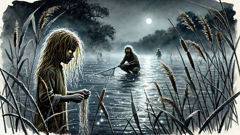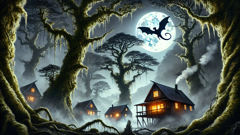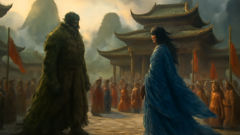Introduction
Where the Magdalena River coils through the emerald valleys of Colombia, legends cling to the mist like dew on banana leaves. Each dawn, the waters shimmer with a restless promise, and each dusk, shadows slip between the reeds. Here, folklore is a living thing, carried in the laughter of children and the whispered prayers of fishermen. Amid the hum of cicadas and the scent of wet earth, the villagers of San Bartolomé have always respected the river—its bounty, its moods, and its mysteries. For generations, tales of the Mohan have seeped into daily life, shaping every cautionary word and superstitious ritual. Some say the Mohan is a wild man with hair like riverweed, gold eyes agleam in the moonlight; others insist he’s a shape-shifter, his laughter echoing in the tangled undergrowth. To outsiders, he’s a story for scaring children away from dangerous waters. But to those who call the Magdalena home, the Mohan is more than myth: he’s the river’s shadow, unpredictable and eternal. On humid nights when fog crawls in from the banks and the sky blooms with stars, the line between the real and the imagined blurs. Nets disappear from canoes, voices vanish on the wind, and sometimes—just sometimes—a village daughter will follow a melody no one else can hear. This is the story of Lucía, whose curiosity drew her into the Mohan’s world, and of a community forever shaped by the enigmatic spirit of the river.
I. The River's Secret Keeper
In San Bartolomé, the river was both provider and threat. By day, it sparkled under the sun, offering tilapia and bocachico to the patient hands of fishermen. By night, it turned treacherous, its currents swirling with secrets, its banks echoing with the unseen. The villagers moved through life guided by river rhythms, their stories tied to its shifting moods.

Lucía grew up in a house that perched precariously on stilts, just above the flood line. Her father, Don Ramiro, was a fisherman who could read the river’s subtle changes—the tint of the water, the hush before a storm. Her mother, Doña Clara, wove hammocks and braided Lucía’s hair while reciting tales of the Mohan. “He’ll steal your comb if you’re careless,” she’d say, “or lure you away if you’re too bold.” Lucía’s older brother, Pablo, laughed at such warnings. He claimed he’d seen nothing more than fat otters and quick fish in the river’s shadows.
But Lucía was different. She listened closely to every story and watched the river with wide eyes. When fishing nets vanished overnight, or when women’s jewelry disappeared from their windowsills, she wondered if the Mohan truly walked among them. Each time her father found his nets tangled beyond repair, or her mother lost another silver pin, Lucía felt a ripple of unease. The villagers’ explanations were always the same: “It’s the Mohan—no use blaming anyone else.”
One humid afternoon, Lucía wandered down to the water’s edge while her mother napped in the shade. There, she found fresh footprints leading away from a pile of shredded net. A faint trail of muddy water wound into the thick reeds. Lucía’s heart thudded with fear and curiosity. She followed, careful not to make a sound. The reeds pressed close, their tips brushing her arms. Suddenly, she heard a low, melodic hum—a tune she didn’t recognize, yet it tugged at something deep inside her.
Peering through the reeds, Lucía glimpsed a figure crouched by the water. His hair was matted and long, full of tangled weeds and tiny river shells. His skin gleamed bronze in the sunlight, and his eyes flashed gold. He toyed with her father’s net, fingers moving with inhuman dexterity. Lucía’s breath caught. This had to be the Mohan.
The figure looked up, and for a moment, their eyes met. Lucía felt as if the river itself had seized her—a cold, electric thrill running down her spine. The Mohan grinned, revealing sharp teeth, then vanished into the water with a splash, leaving only ripples behind. Lucía stumbled back, unsure if she’d imagined it all.
At home that night, she tried to tell her family what she’d seen. Her mother shushed her, making the sign of the cross. Her father’s face grew grave. "The Mohan doesn’t like to be watched," he warned. "Best to leave him be."
But curiosity gnawed at Lucía. Over the following days, she noticed more oddities: a neighbor’s gold earring glinting in the mud, the village’s fishing nets tied into impossible knots, wild lilies arranged on her windowsill. Each sign felt like a message only she could decipher.
When the river rose after a night of thunder, panic swept the village. Fishermen returned empty-handed, and whispers spread that someone had angered the Mohan. Some blamed Lucía for poking her nose where it didn’t belong. Others begged her to return any trinket she’d found near the water. Lucía felt guilt and confusion; she hadn’t taken anything, but she couldn’t deny the Mohan seemed to have noticed her.
That evening, as Lucía sat watching the river blush with sunset, she heard the humming again—closer now, a hypnotic melody rising from the reeds. Compelled, she followed it to a bend in the river she’d never visited. There, moonlight painted silver paths across the water. The Mohan appeared once more, hair gleaming with moonbeams, eyes kind and wild all at once.
He beckoned Lucía closer. This time, fear faded, replaced by wonder. In a voice like rushing water, the Mohan spoke: “Why do you seek me, niña?”
Lucía hesitated, then spoke her truth: "I want to understand why you take our things. Are you angry, lonely... or just playful?"
The Mohan’s laughter sounded like the river itself—sometimes gentle, sometimes roaring. “The river gives and takes. People forget that it has its own spirit. I borrow what is left behind, what is not cherished. Sometimes, I test those who ignore the river’s warnings.”
Lucía realized the Mohan was not merely a thief or monster—he was a guardian, a reflection of everything wild and unpredictable about the river. She promised to respect his domain and carry his message back to her people.
From that night on, Lucía became the village’s new storyteller. She taught children to respect the river, to care for their nets, and to listen for the Mohan’s song. And sometimes, late at night, she’d find a wildflower on her windowsill—a silent reminder that the river watched over them all.
II. Whispers Beneath the Water
The legend of Lucía and her encounter with the Mohan rippled through San Bartolomé like a stone thrown into still water. Elders whispered of the old days, when spirits dwelled in every tree and stream, while children peered into the reeds with a mixture of dread and fascination. Life continued, but with a new attentiveness; offerings of cassava bread and sweet fruit appeared on the riverbanks, and nets were checked for rips before dusk.

Yet the Mohan’s presence lingered, felt more keenly after Lucía’s meeting. Some nights, nets still vanished or returned in tatters, but now the villagers left small gifts—bright beads, carved wooden combs—hoping to appease the river spirit. Fishermen began to tell tales of catching glimpses of wild hair beneath the surface or hearing low laughter on foggy mornings. The Mohan had become both a warning and a protector, a reminder that the river’s bounty was never to be taken for granted.
Lucía herself changed after that night. She awoke from dreams filled with swirling water and shimmering fish, always accompanied by the Mohan’s haunting song. Her brother Pablo teased her at first, but even he grew wary after losing his best knife by the water’s edge—only to find it later, miraculously cleaned and sharpened, resting beside a bunch of river lilies.
One day, a crisis struck. Heavy rains swelled the Magdalena past its banks, threatening to flood San Bartolomé. The villagers worked together to fortify their homes and move livestock to higher ground, but panic spread as the river surged higher. At night, frightened families huddled in their houses, listening to the relentless drumming of rain on palm-thatched roofs.
During one such night, Lucía heard a voice calling her name—not from the house, but from the river itself. She slipped outside, drawn by an overwhelming sense of urgency. The river was a churning, roaring beast now, its current glowing faintly in the stormy dark. In the midst of the chaos, Lucía saw the Mohan standing on a half-submerged log, gesturing for her to come closer.
Terrified but trusting, Lucía waded into the water. The Mohan spoke in a rush: “Your people must leave now—the old dike is breaking. If you stay, you’ll lose everything.”
Lucía ran back to her family and roused the village. She pleaded for everyone to move to higher ground, repeating the Mohan’s warning. Skeptics hesitated, but fear won out. As dawn broke, the dike finally gave way, sending a torrent through the village. Thanks to Lucía’s warning, everyone escaped unharmed, though homes and boats were battered by the flood.
In the aftermath, gratitude for Lucía’s bravery mingled with renewed respect for the Mohan. The villagers rebuilt their homes with a new reverence for the river, marking each season’s first catch with offerings to the water spirit. Lucía continued to serve as a bridge between her people and the world of spirits, teaching children to honor what they could not always see.
Over time, the Mohan’s legend evolved. He was no longer seen as just a mischievous thief but as a guardian whose mischief held deeper meaning—a warning against neglecting nature or taking its gifts without gratitude. Lucía grew into a wise woman known for her stories and her understanding of the river’s moods. Whenever disaster threatened, people remembered her tale and listened for the river’s whispering shadow.
Years later, when Lucía herself became a mother, she taught her own children to watch for wildflowers on their windowsills and to heed the songs that rose from the Magdalena at dusk. The Mohan’s legacy flowed through the generations, as eternal as the river itself.
Conclusion
The Magdalena River kept flowing, winding its way through forests and fields, past villages that remembered its gifts and its warnings. For as long as people lived on its banks, the legend of the Mohan endured—sometimes as a caution, sometimes as a comfort. Lucía’s story became part of that living folklore, a thread woven into each hammock and echoed in every lullaby sung by the water’s edge. The Mohan’s laughter still mingled with the rustling reeds, and his wildflowers still appeared on windowsills. In learning to listen—to each other, to nature, and to the quiet voices beneath the surface—the people of San Bartolomé found resilience and wisdom. The river spirit’s mischief was never forgotten, but neither was his guardianship. Life by the Magdalena meant respecting both what could be seen and what remained mysterious. And so, even as the world changed and the village grew, the legend of the Mohan lived on—a whispering shadow in the heart of Colombia, reminding all who heard his song that nature’s power is both wild and wondrous.


















